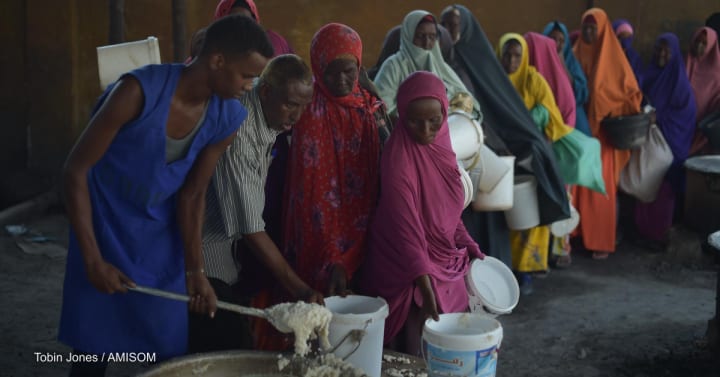Watch the full event recording.

Women line up at a feeding center in Mogadishu, Somalia. Photo by: Tobin Jones / AMISOM”According to the recently published Global Report on Food Crisis mid-year update, up to 205 million people are expected to face acute food insecurity that puts them in need of urgent assistance, and the latest estimates show that this number could be as high as 222 million people this year.
Amid the growing crisis, faith-based organizations are among those stepping up. Barron Segar, president and CEO at the World Food Program USA said he was “incredibly overwhelmed” by the support the organization has received from FBOs.
“Faith-based partners inspire giving, inspire a connection to community,” he said. “I think faith-based organizations really believe that the world is one place, you love thy neighbor, as you love thyself, and, and the world.”
Speaking at a Devex event held on the sidelines of the United Nations General assembly, leaders of FBOs detailed some of the advantages of working with faith groups and communities when responding to the food crisis.
Robert Hokanson, senior manager of global priorities and special projects at the Church of Jesus Christ of Latter-day Saints, said organizations such as his represent faith communities.
“A community by definition brings people together. And not just for a random reason, but brings people together for a common purpose, a common cause, united around common belief,” he said. “When that happens, you have the ability to marshal resources.”
Hokanson added that faith communities are able to mobilize cash donations very quickly but their real power lies in their ability to mobilize people who adhere to the faith. He said FBOs connect and engage with the local community and “can look out for others” and “watch for those who may be at risk or who are in need.”
“We don’t have to wait for a formal call,” he said. “We’re in a position that we can take action.”
Anwar Khan, president and co-founder at Islamic Relief USA, said faith groups are able to go to places others may not have access to, because of their cultural proximity and advantages of sharing the same faith.
“That brings down some of the barriers,” he said. “It helps to bring down walls.”
He added that faith groups also understand the religious cycles that people go through and are able to tailor their responses in a way that respects these cycles. Faith literacy — knowing the dietary restrictions, knowing when holidays fall, knowing when adherents are fasting — is important to having and maintaining access, he said.”
Read the full article on Devex News.